23 jan 2019
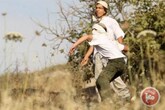
Israeli bulldozers razed Palestinian agricultural lands in the southern occupied West Bank city of Hebron, on Wednesday afternoon.
Locals reported that Israeli bulldozers razed some 15 dunams of agricultural lands, and destroyed retaining walls around them in the Wadi al-Samn area of southern Hebron.
The lands were identified as belonging to Said Abu Hadid .
Between 500,000 and 600,000 Israelis live in Jewish-only settlements across occupied East Jerusalem and the West Bank in violation of international law.
The Palestinian government has no jurisdiction over Israelis in the West Bank, and acts carried out by Israeli settlers often occur in the presence of Israeli military forces who rarely act to protect Palestinian residents.
The majority of settler thefts committed against Palestinians are met with impunity, with Israelis rarely facing consequences for such thefts.
Locals reported that Israeli bulldozers razed some 15 dunams of agricultural lands, and destroyed retaining walls around them in the Wadi al-Samn area of southern Hebron.
The lands were identified as belonging to Said Abu Hadid .
Between 500,000 and 600,000 Israelis live in Jewish-only settlements across occupied East Jerusalem and the West Bank in violation of international law.
The Palestinian government has no jurisdiction over Israelis in the West Bank, and acts carried out by Israeli settlers often occur in the presence of Israeli military forces who rarely act to protect Palestinian residents.
The majority of settler thefts committed against Palestinians are met with impunity, with Israelis rarely facing consequences for such thefts.
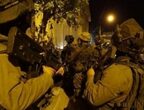
The Palestinian Prisoners’ Society (PPS) has reported that Israeli soldiers abducted, on Wednesday at dawn, at least thirteen Palestinians from their homes in several parts of the occupied West Bank.
The PPS stated that the soldiers invaded and searched many homes across the West Bank, and interrogated dozens of residents while inspecting their ID cards.
In Hebron governorate, in southern West Bank, the soldiers abducted Saif Abu Aisha, Hasan Mahmoud Abu Zneid and Khalil Mohammad al-Beerawi.
In Bethlehem, the soldiers abducted Jom’a Khaled Abu Mfarreh, Fadi Adnan al-Badan, 16, and Mahmoud Rateb al-‘Amour, 15.
In occupied Jerusalem, the soldiers abducted three young men, identified as Abdul-Qader Dari, Mohammad Sharif Mheisin and Mohammad Mahmoud Atiya, while Bilal Mteir was taken from his home in Qalandia refugee camp, north of the city.
In Nablus, in northern West Bank, the soldiers abducted Hisham Abu Saleh and Mo’taz Hussein.
In Jenin, also in northern West Bank, the soldiers abducted Ezzeddin Osama Abu Hamdi.
In related news, the soldiers invaded agricultural lands in Wad as-Summan area, in Hebron city, before bulldozing lands and demolishing retaining walls.
The PPS stated that the soldiers invaded and searched many homes across the West Bank, and interrogated dozens of residents while inspecting their ID cards.
In Hebron governorate, in southern West Bank, the soldiers abducted Saif Abu Aisha, Hasan Mahmoud Abu Zneid and Khalil Mohammad al-Beerawi.
In Bethlehem, the soldiers abducted Jom’a Khaled Abu Mfarreh, Fadi Adnan al-Badan, 16, and Mahmoud Rateb al-‘Amour, 15.
In occupied Jerusalem, the soldiers abducted three young men, identified as Abdul-Qader Dari, Mohammad Sharif Mheisin and Mohammad Mahmoud Atiya, while Bilal Mteir was taken from his home in Qalandia refugee camp, north of the city.
In Nablus, in northern West Bank, the soldiers abducted Hisham Abu Saleh and Mo’taz Hussein.
In Jenin, also in northern West Bank, the soldiers abducted Ezzeddin Osama Abu Hamdi.
In related news, the soldiers invaded agricultural lands in Wad as-Summan area, in Hebron city, before bulldozing lands and demolishing retaining walls.
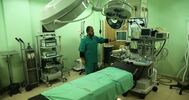
The Palestinian ministry of health has warned that the health services in Gaza have become at a dangerous juncture due to the fuel crisis, appealing to all concerned parties to take immediate steps to prevent an imminent disaster.
In a statement, the ministry affirmed that the health facilities in Gaza need 300, 000 liters of diesel per month to operate generators in light of the current power outages.
The ministry expressed its appreciation to the Turkish humanitarian group IHH, the Abu Asi gas station and al-Falah Charity for providing a total contribution of 15,700 liters of diesel for different hospitals, but it pointed out that such fuel quantities would be used within a few days.
In a statement, the ministry affirmed that the health facilities in Gaza need 300, 000 liters of diesel per month to operate generators in light of the current power outages.
The ministry expressed its appreciation to the Turkish humanitarian group IHH, the Abu Asi gas station and al-Falah Charity for providing a total contribution of 15,700 liters of diesel for different hospitals, but it pointed out that such fuel quantities would be used within a few days.

UN Special Coordinator for the Middle East Peace Process Nickolay Mladenov on Tuesday warned of a possible humanitarian disaster in the Gaza Strip.
This was voiced during a UN Security Council session in New York on the current situation in the Middle East, especially in the Palestinian arena.
Mladenov said that the establishment of an independent Palestinian state is becoming more difficult, renewing the UN's rejection of the Israeli settlement expansion in the Palestinian territories.
Mladenov pointed out that the situation in the Gaza Strip, which is witnessing economic collapse and declining support, is catastrophic.
The current situation might lead to an endless conflict unless there are "vision and political will" shown by all parties, he added.
Mladenov stressed that the Israeli settlements are an obstacle to the peace process and are illegal under international law.
This was voiced during a UN Security Council session in New York on the current situation in the Middle East, especially in the Palestinian arena.
Mladenov said that the establishment of an independent Palestinian state is becoming more difficult, renewing the UN's rejection of the Israeli settlement expansion in the Palestinian territories.
Mladenov pointed out that the situation in the Gaza Strip, which is witnessing economic collapse and declining support, is catastrophic.
The current situation might lead to an endless conflict unless there are "vision and political will" shown by all parties, he added.
Mladenov stressed that the Israeli settlements are an obstacle to the peace process and are illegal under international law.

Israel’s former Shin Bet head Yaakov Peri said that Israel needs to continue transferring Qatari funds to the blockaded Gaza Strip.
In an interview on Israel Army Radio on Wednesday morning, Peri said that the decision not to transfer the funds has increased the possibility of a flare-up between Israel and Hamas in the Gaza coastal enclave.
"Hamas will not become a lover of Israel because of the money or because of its non-transfer," said Peri. "Israel needs to act according to its own interest, which is to avoid confrontation. If the same Qatari funds cause a confrontation not to occur, the broader consideration must prevail."
The former Shin Bet head said he expects that in the end the money will be transferred because "we do not have a choice."
"We have been on the brink of a humanitarian crisis in Gaza for a while now, and once it blows up, the world will come to us with complaints," he added.
Speaking from his office in Doha a couple of days ago, Mohammed Al-Emadi, head of Qatar’s Gaza Strip Reconstruction Committee, said the latest $15 million wage payment was initially withheld by Israel but would now arrive on Wednesday.
However, Israel’s Prime Minister Benjamin Netanyahu ordered on Tuesday to halt the third wave of the transfer of Qatari funds to the besieged Gaza Strip.
Netanyahu orders halt on Qatari funds to Gaza
Israeli Prime Minister Benjamin Netanyahu ordered that Qatari funds that were scheduled to be sent to the besieged Gaza Strip on Wednesday, be halted, after an Israeli soldier was lightly injured by a bullet reportedly shot from Gaza a day earlier.
The funds were supposed to resume on Wednesday after a two-week ban due to incendiary balloons launched from the Gaza Strip.
The Israeli soldiers was reportedly injured after a bullet was fired from the Gaza Strip towards the border fence where he was deployed, shortly after the Israeli artillery shelled al-Breij killing one Palestinian and injuring four others.
In an interview on Israel Army Radio on Wednesday morning, Peri said that the decision not to transfer the funds has increased the possibility of a flare-up between Israel and Hamas in the Gaza coastal enclave.
"Hamas will not become a lover of Israel because of the money or because of its non-transfer," said Peri. "Israel needs to act according to its own interest, which is to avoid confrontation. If the same Qatari funds cause a confrontation not to occur, the broader consideration must prevail."
The former Shin Bet head said he expects that in the end the money will be transferred because "we do not have a choice."
"We have been on the brink of a humanitarian crisis in Gaza for a while now, and once it blows up, the world will come to us with complaints," he added.
Speaking from his office in Doha a couple of days ago, Mohammed Al-Emadi, head of Qatar’s Gaza Strip Reconstruction Committee, said the latest $15 million wage payment was initially withheld by Israel but would now arrive on Wednesday.
However, Israel’s Prime Minister Benjamin Netanyahu ordered on Tuesday to halt the third wave of the transfer of Qatari funds to the besieged Gaza Strip.
Netanyahu orders halt on Qatari funds to Gaza
Israeli Prime Minister Benjamin Netanyahu ordered that Qatari funds that were scheduled to be sent to the besieged Gaza Strip on Wednesday, be halted, after an Israeli soldier was lightly injured by a bullet reportedly shot from Gaza a day earlier.
The funds were supposed to resume on Wednesday after a two-week ban due to incendiary balloons launched from the Gaza Strip.
The Israeli soldiers was reportedly injured after a bullet was fired from the Gaza Strip towards the border fence where he was deployed, shortly after the Israeli artillery shelled al-Breij killing one Palestinian and injuring four others.
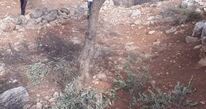
The Israeli forces on Tuesday uprooted 60 Palestinian-owned olive trees in Jaba' village in Occupied Jerusalem.
Head of Jaba' village council Msallam Dar Salim said that the Israeli forces demolished walls and fences surrounding Palestinian farmlands and uprooted 60 olive trees.
According to Dar Salim, the Israeli forces attack Palestinian lands and property in the village on a regular basis claiming that they are located in Area C, which is exclusively administered by Israel based on the Oslo Accords.
Dar Salim said that Israel had carried out demolitions in four different sites in the village, which is inhabited by about 4,000 Palestinians, and established Adam settlement, a military checkpoint, and a mall.
Soldiers and Settlers Destroy Hundreds of Trees in West Bank
Israeli soldiers, on Tuesday, uprooted 60 olive trees in the central West Bank village of Jaba, to the east of Jerusalem, and taking possession them, according to the head of Jaba village council, Musallam Dar Salim.
He said, according to WAFA correspondence, that the soldiers demolished retaining walls and fences built around a plot of land located near an Israeli military checkpoint and then proceeded to uproot the trees.
He said the army claims the area targeted is classified “C”, which means it is under full Israeli control and Palestinians are not allowed to develop it.
Some 4,000 people live in Jaba, which has seen most of its land taken away from it, by Israel, to build the illegal settlement of Adam and an Israeli shopping area, said Dar Salim.
Israeli settlers, on Tuesday, chopped down hundreds of olive trees in the town of Beit Ummar, in the south of the occupied West Bank, according to a local activist.
Yousef Abu Maria, active in the anti-settlements movement in the town, said that settlers from the illegal settlement of Beit Ein, built on Beit Ummar land, chopped hundreds of trees from a plot of land belonging to Ibrahim Talji, a local farmer in the north of the town.
He said this was not the first time Beit Ein settlers have vandalized Talji and other farmers’ land in that section of the town, and that every time the farmers replant the land, the settlers come back to uproot them.
Head of Jaba' village council Msallam Dar Salim said that the Israeli forces demolished walls and fences surrounding Palestinian farmlands and uprooted 60 olive trees.
According to Dar Salim, the Israeli forces attack Palestinian lands and property in the village on a regular basis claiming that they are located in Area C, which is exclusively administered by Israel based on the Oslo Accords.
Dar Salim said that Israel had carried out demolitions in four different sites in the village, which is inhabited by about 4,000 Palestinians, and established Adam settlement, a military checkpoint, and a mall.
Soldiers and Settlers Destroy Hundreds of Trees in West Bank
Israeli soldiers, on Tuesday, uprooted 60 olive trees in the central West Bank village of Jaba, to the east of Jerusalem, and taking possession them, according to the head of Jaba village council, Musallam Dar Salim.
He said, according to WAFA correspondence, that the soldiers demolished retaining walls and fences built around a plot of land located near an Israeli military checkpoint and then proceeded to uproot the trees.
He said the army claims the area targeted is classified “C”, which means it is under full Israeli control and Palestinians are not allowed to develop it.
Some 4,000 people live in Jaba, which has seen most of its land taken away from it, by Israel, to build the illegal settlement of Adam and an Israeli shopping area, said Dar Salim.
Israeli settlers, on Tuesday, chopped down hundreds of olive trees in the town of Beit Ummar, in the south of the occupied West Bank, according to a local activist.
Yousef Abu Maria, active in the anti-settlements movement in the town, said that settlers from the illegal settlement of Beit Ein, built on Beit Ummar land, chopped hundreds of trees from a plot of land belonging to Ibrahim Talji, a local farmer in the north of the town.
He said this was not the first time Beit Ein settlers have vandalized Talji and other farmers’ land in that section of the town, and that every time the farmers replant the land, the settlers come back to uproot them.
22 jan 2019
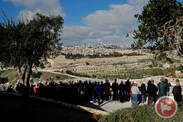
A Palestinian man from occupied East Jerusalem was forced to demolish his car repair shop in the Issawiya neighborhood, on Monday night, in order to avoid incurring a heavy demolition fee from the Israeli municipality, who ordered his home be destroyed under the pretext that it was built without an Israeli-issued permit.
The Issawiya resident, Haitham Mustafa, was forced to demolish his car repair shop to avoid paying demolition fines to the Israeli Civil Administration, which would amount to 80,000 shekels ($21,689).
Israel rarely grants Palestinians permits to build in East Jerusalem, though the Jerusalem municipality has claimed that compared to the Jewish population, they receive a disproportionately low number of permit applications from Palestinian communities, which also see high approval ratings.
For Jewish Israelis in occupied East Jerusalem’s illegal settlements, the planning, marketing, development, and infrastructure are funded and executed by the Israeli government. By contrast, in Palestinian neighborhoods, all the burden falls on individual families to contend with a lengthy permit application that can last several years and cost tens of thousands of dollars.
According to Daniel Seidemann of the NGO Terrestrial Jerusalem, “Since 1967, the Government of Israel has directly engaged in the construction of 55,000 units for Israelis in East Jerusalem; in contrast, fewer than 600 units have been built for Palestinians in East Jerusalem, the last of which were built 40 years ago. So much for (Jerusalem Mayor Nir) Barkat’s claim ‘we build for everyone.’”
According to UN documentation, three Palestinians were displaced and five buildings have been demolished in East Jerusalem since the beginning of the year as of Jan. 29. In 2017, a total of 142 buildings were destroyed in East Jerusalem, displacing 233 Palestinians.
The Issawiya resident, Haitham Mustafa, was forced to demolish his car repair shop to avoid paying demolition fines to the Israeli Civil Administration, which would amount to 80,000 shekels ($21,689).
Israel rarely grants Palestinians permits to build in East Jerusalem, though the Jerusalem municipality has claimed that compared to the Jewish population, they receive a disproportionately low number of permit applications from Palestinian communities, which also see high approval ratings.
For Jewish Israelis in occupied East Jerusalem’s illegal settlements, the planning, marketing, development, and infrastructure are funded and executed by the Israeli government. By contrast, in Palestinian neighborhoods, all the burden falls on individual families to contend with a lengthy permit application that can last several years and cost tens of thousands of dollars.
According to Daniel Seidemann of the NGO Terrestrial Jerusalem, “Since 1967, the Government of Israel has directly engaged in the construction of 55,000 units for Israelis in East Jerusalem; in contrast, fewer than 600 units have been built for Palestinians in East Jerusalem, the last of which were built 40 years ago. So much for (Jerusalem Mayor Nir) Barkat’s claim ‘we build for everyone.’”
According to UN documentation, three Palestinians were displaced and five buildings have been demolished in East Jerusalem since the beginning of the year as of Jan. 29. In 2017, a total of 142 buildings were destroyed in East Jerusalem, displacing 233 Palestinians.
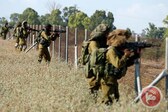
Israeli forces opened fire, on Tuesday morning, towards Palestinian farmers working in their lands in multiple locations in the besieged Gaza Strip, while the Israeli navy targeted fishermen at sea.
Eyewitnesses told Ma'an that Israeli forces opened fire towards Palestinian farmers, who were working in their agricultural lands in the eastern and southern parts of Gaza.
The farmers were forced to leave their lands in fear for their lives.
Meanwhile, Israeli naval forces repeatedly opened heavy fire at fishing boats, forcing fishermen to sail back to shore.
No injuries were reported from neither of the incidents.
The Israeli army regularly detains and opens fire on unarmed Palestinian fishermen, shepherds and farmers along the border areas if they approach the unilaterally declared buffer zone.
As part of Israel's blockade of the coastal enclave since 2007, the Israeli army, citing security concerns, requires Palestinian fishermen to work within a limited "designated fishing zone," the exact limits of which are decided by the Israeli authorities and have historically fluctuated.
Israeli human rights group B'Tselem recently concluded that Israel's Gaza closure and "harassment of fishermen" have been "destroying Gaza's fishing sector," with 95% of fishermen living below the poverty line.
Eyewitnesses told Ma'an that Israeli forces opened fire towards Palestinian farmers, who were working in their agricultural lands in the eastern and southern parts of Gaza.
The farmers were forced to leave their lands in fear for their lives.
Meanwhile, Israeli naval forces repeatedly opened heavy fire at fishing boats, forcing fishermen to sail back to shore.
No injuries were reported from neither of the incidents.
The Israeli army regularly detains and opens fire on unarmed Palestinian fishermen, shepherds and farmers along the border areas if they approach the unilaterally declared buffer zone.
As part of Israel's blockade of the coastal enclave since 2007, the Israeli army, citing security concerns, requires Palestinian fishermen to work within a limited "designated fishing zone," the exact limits of which are decided by the Israeli authorities and have historically fluctuated.
Israeli human rights group B'Tselem recently concluded that Israel's Gaza closure and "harassment of fishermen" have been "destroying Gaza's fishing sector," with 95% of fishermen living below the poverty line.
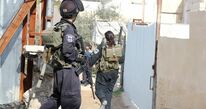
The Israeli authorities ordered on Tuesday the demolition of ten Palestinian facilities in Issawiya town, northeast of occupied Jerusalem.
Muhammad Abu al-Hummus, member of a local follow-up committee, said that several crew members from the Israeli municipality of Jerusalem stormed the town and started filming a number of local facilities.
The crews have notified more than ten Palestinian-owned facilities with demolition under the pretext of being built without Israeli permit, he added. video
Earlier Monday, Israeli forces forced a Palestinian resident to demolish his car repair shop, in Issawiya town, under the same pretext.
Muhammad Abu al-Hummus, member of a local follow-up committee, said that several crew members from the Israeli municipality of Jerusalem stormed the town and started filming a number of local facilities.
The crews have notified more than ten Palestinian-owned facilities with demolition under the pretext of being built without Israeli permit, he added. video
Earlier Monday, Israeli forces forced a Palestinian resident to demolish his car repair shop, in Issawiya town, under the same pretext.
21 jan 2019

Israeli naval forces detained a 22-year-old Palestinian fisherman while working off the coast of the northern besieged Gaza Strip, on late Sunday.
The Head of the Palestinian Fishermen Union in Gaza, Zakariya Bakr, confirmed that Israeli authorities informed the family of the fisherman, Muhammad Hussam Bakr, 22, of his detention while working off the coast in northern Gaza.
The reason for Muhammad’s detention remained unknown.
As part of Israel's blockade of the coastal enclave since 2007, the Israeli army, citing security concerns, requires Palestinian fishermen to work within a limited "designated fishing zone," the exact limits of which are decided by the Israeli authorities and have historically fluctuated.
The Israeli army regularly detains and opens fire on unarmed Palestinian fishermen, shepherds, and farmers along the border areas if they approach the unilaterally declared buffer zone.
Israeli human rights group B'Tselem recently concluded that Israel's Gaza closure and "harassment of fishermen" have been "destroying Gaza's fishing sector," with 95% of fishermen living below the poverty line.
The Head of the Palestinian Fishermen Union in Gaza, Zakariya Bakr, confirmed that Israeli authorities informed the family of the fisherman, Muhammad Hussam Bakr, 22, of his detention while working off the coast in northern Gaza.
The reason for Muhammad’s detention remained unknown.
As part of Israel's blockade of the coastal enclave since 2007, the Israeli army, citing security concerns, requires Palestinian fishermen to work within a limited "designated fishing zone," the exact limits of which are decided by the Israeli authorities and have historically fluctuated.
The Israeli army regularly detains and opens fire on unarmed Palestinian fishermen, shepherds, and farmers along the border areas if they approach the unilaterally declared buffer zone.
Israeli human rights group B'Tselem recently concluded that Israel's Gaza closure and "harassment of fishermen" have been "destroying Gaza's fishing sector," with 95% of fishermen living below the poverty line.
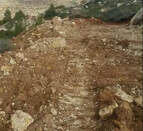
Several Israeli army vehicles and bulldozers invaded, Monday, Palestinian agricultural lands in the al-Kharja area in Battir town, west of Bethlehem in the occupied West Bank, and bulldozed nearly 60 Dunams of farmlands in addition to uprooting 60 olive trees.
Taiseer Qattoush, the mayor of Battir, said a large military force invaded the al-Kharja area after surrounding it, and bulldozed nearly 15 Dunams of lands, including retaining stone walls, and uprooted 60 olive trees.
Qattoush added that the lands are privately owned by two Palestinians from Battir, identified as Raed Abu Hreitha and Riyad Abu Hreitha.
The soldiers closed the entire area and prevented the Palestinians from entering their lands while the soldiers were uprooting them.
The attack is part of Israel’s ongoing violations against the Palestinians and their lands, including the repeated attempts to build and construct its illegal colonies, in direct violation of International Law and the Fourth Geneva Convention.
Taiseer Qattoush, the mayor of Battir, said a large military force invaded the al-Kharja area after surrounding it, and bulldozed nearly 15 Dunams of lands, including retaining stone walls, and uprooted 60 olive trees.
Qattoush added that the lands are privately owned by two Palestinians from Battir, identified as Raed Abu Hreitha and Riyad Abu Hreitha.
The soldiers closed the entire area and prevented the Palestinians from entering their lands while the soldiers were uprooting them.
The attack is part of Israel’s ongoing violations against the Palestinians and their lands, including the repeated attempts to build and construct its illegal colonies, in direct violation of International Law and the Fourth Geneva Convention.
20 jan 2019

The Palestinian Ministry of Health in the Gaza Strip on Sunday warned of an unprecedented humanitarian and health disaster in the enclave after seven hospitals were forced to suspend services because of the power shortage.
Head of al-Rantisi Children's Hospital, which is one of only two facilities in Gaza equipped to treat cancer patients, Mohammed Salmiya said in a press conference, "For the first time since Israel imposed the blockade on the Gaza Strip, we are unable to make further efforts to run power generators for additional hours."
Abu Salmiya said that, based on daily field reports by technical and administrative staff, what is available at Gaza hospitals is less than 17% of the fuel needed during power outages.
Abu Salmiya noted that the austerity measures taken by the Ministry of Health will soon become useless as the crisis is worsening.
Gaza's Ministry of Health appealed to those concerned to make serious actions toward ending the crisis and fulfilling Gaza patients' right to receive proper treatment.
The Ministry of Health in the Gaza Strip has been suffering from growing crises in different fields as a result of the Israeli 13-year-long blockade on the enclave, and the sanctions imposed by the Palestinian Authority government for about two years.
Gaza hospitals need 45,000 liters of fuel per month to operate generators during power outages which last for 8-12 hours a day.
Head of al-Rantisi Children's Hospital, which is one of only two facilities in Gaza equipped to treat cancer patients, Mohammed Salmiya said in a press conference, "For the first time since Israel imposed the blockade on the Gaza Strip, we are unable to make further efforts to run power generators for additional hours."
Abu Salmiya said that, based on daily field reports by technical and administrative staff, what is available at Gaza hospitals is less than 17% of the fuel needed during power outages.
Abu Salmiya noted that the austerity measures taken by the Ministry of Health will soon become useless as the crisis is worsening.
Gaza's Ministry of Health appealed to those concerned to make serious actions toward ending the crisis and fulfilling Gaza patients' right to receive proper treatment.
The Ministry of Health in the Gaza Strip has been suffering from growing crises in different fields as a result of the Israeli 13-year-long blockade on the enclave, and the sanctions imposed by the Palestinian Authority government for about two years.
Gaza hospitals need 45,000 liters of fuel per month to operate generators during power outages which last for 8-12 hours a day.
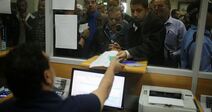
The Hebrew army radio, Galei Tzahal, said Sunday that the Israeli government lifted the ban imposed two weeks ago on the transfer of Qatari aid funds to the Gaza Strip.
According to the army radio, Qatari envoy to Gaza Mohamed al-Emadi will arrive in Gaza on Sunday night or Monday through an Israeli airport and will bring with him the money.
Two weeks ago, the Israeli government decided to delay the entry of funds from Qatar to the besieged enclave.
Qatar provides generously $15 million a month to help the authorities in Gaza pay salaries to civil servants and help impoverished families.
According to the army radio, Qatari envoy to Gaza Mohamed al-Emadi will arrive in Gaza on Sunday night or Monday through an Israeli airport and will bring with him the money.
Two weeks ago, the Israeli government decided to delay the entry of funds from Qatar to the besieged enclave.
Qatar provides generously $15 million a month to help the authorities in Gaza pay salaries to civil servants and help impoverished families.
19 jan 2019

The Palestinian Ministry of Health in the Gaza Strip on Saturday warned that five hospitals in the enclave are on the verge of shutting down due to power outages.
Spokesman for the Ministry Ashraf al-Qedra said that the next few hours will be crucial for five major hospitals in Gaza, including two children's hospitals.
According to al-Qedra, these hospitals are to face the same fate of Beit Hanoun Hospital which has closed its doors due to power shortage resulting from depletion of fuel used to run alternative generators during power outage.
The Ministry of Health in the Gaza Strip has been suffering from acute power and drug shortage as a result of the 13-year-long blockade and the sanctions imposed on the enclave by the Palestinian Authority for nearly two years now.
Spokesman for the Ministry Ashraf al-Qedra said that the next few hours will be crucial for five major hospitals in Gaza, including two children's hospitals.
According to al-Qedra, these hospitals are to face the same fate of Beit Hanoun Hospital which has closed its doors due to power shortage resulting from depletion of fuel used to run alternative generators during power outage.
The Ministry of Health in the Gaza Strip has been suffering from acute power and drug shortage as a result of the 13-year-long blockade and the sanctions imposed on the enclave by the Palestinian Authority for nearly two years now.
